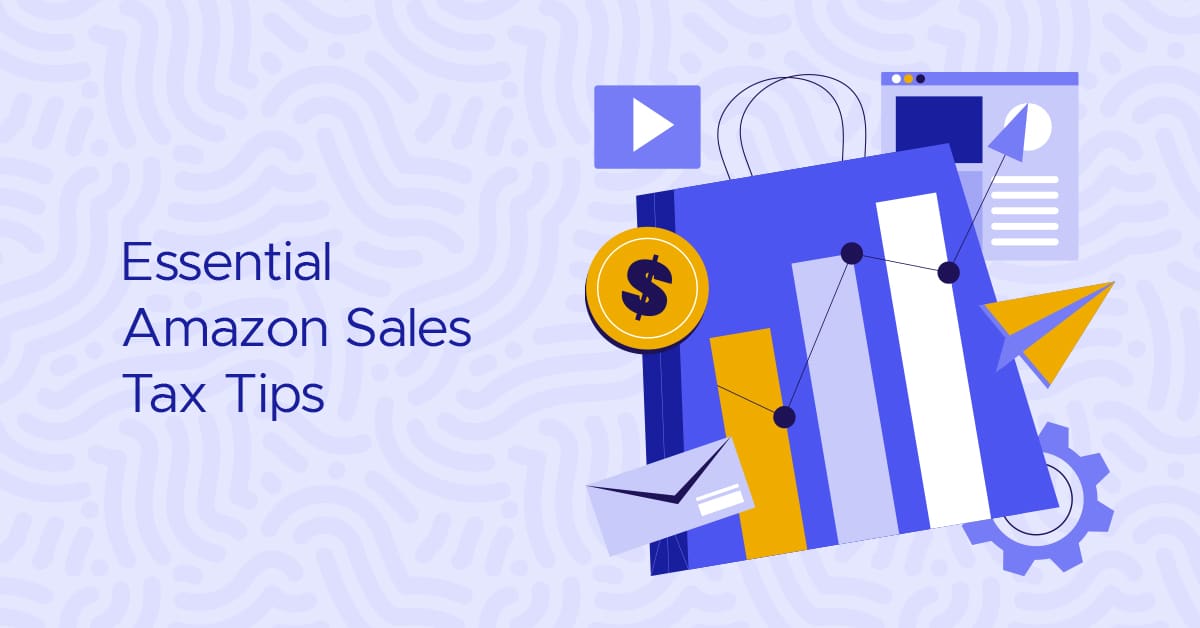
Essential Amazon Sales Tax Tips

This is a guest post from Dave Heistein, CPA. Dave is the co-founder and managing partner of Profitwise Accounting. He is an advanced QuickBooks ProAdvisor and instructor with more than 20 years of experience in finance, tax, and operational management.
Do you sell on Amazon and struggle with your sales tax? If so, we’re here to explain the details of this complex business aspect, from the essentials to practical tips on managing Amazon sales tax effectively and maintaining healthy profits.
Understanding the basics of sales tax
Sales tax is a percentage of the sale price that a seller collects at the point of purchase and then pays to the government. It’s not a part of your revenue. Instead, it’s a fiduciary duty that you perform on behalf of the state.
Every time a customer buys a product from you, you may need to add a sales tax to the price. It depends on the state laws where each shopper lives. Not all states require sales tax collection.
However, for those that do, the rate can vary significantly between each state, county, and city. This means you must stay on top of the specific sales tax rates and rules for every sale.
Why Amazon sales tax matters for Amazon sellers
Most obviously (and importantly), managing sales tax prevents legal issues. Each state in the U.S. has different rules and rates for this tax, and many have laws specifying when online sellers need to collect and remit it. You could face major fines and audits if you fail to comply with these laws.
Your Amazon sales taxes also help you set competitive prices. If you include tax in the price, you must know exactly how much to charge without overpricing your products, as this can affect your competitiveness in the marketplace; even small differences in price can drive customer choices.
Handling sales tax efficiently enhances your reputation as well. Customers trust sellers who handle their transactions clearly, including tax collection. Given its powerful influence, it’s important you take all necessary steps to manage your sales tax properly.
Know your nexus obligations
Nexus refers to your business’s connection with a state that requires you to collect and remit sales tax in that state. This connection can be established in several ways, such as having a physical presence, employees, or exceeding a certain amount of sales in said state.
For example, if you have a warehouse in a certain state, or if you use Amazon’s Fulfillment by Amazon (FBA) service (which stores your inventory across the country), you likely have a nexus in those states.
Similarly, if you see lots of sales in a particular state, you might also create a nexus, even if you have no physical presence there.
So, take the time to review your sales activities and physical presence in different states. Changes in your business operations or state laws might alter your nexus status, so staying informed and compliant is a must.
Set up automatic Amazon sales tax collection
This impressive feature on the Amazon platform automates the calculation, collection, and charging of correct sales tax for each sale based on the customer’s location and the laws that apply there.
To set it up, log in to your Amazon Seller Central account and go to the tax settings. There, you can give the platform permission to calculate sales tax for your orders by choosing your tax criteria according to where you have nexuses. You’ll also need to input where your products are stored and sold, then Amazon will handle the rest.
This automation is a major asset because it reduces the manual effort of tracking various tax rates across jurisdictions. It also ensures accuracy in the taxes collected, which reduces the risk of errors that could lead to penalties or customer dissatisfaction.
Regularly update your tax collection settings
Tax laws can change frequently, so staying updated helps you avoid costly mistakes.
To keep your settings current, routinely check your Amazon Seller Central account. Aim to review your tax settings at least once each quarter. During these checks, update any changes in where your products are stored, where you have a nexus, and any adjustments in state tax rates.
By keeping these settings up to date, you verify your compliance with tax laws and ensure you don’t over- or undercharge your customers. This indirectly builds trust among consumers as well.
Use accurate tax rate tables for every state
When you have accurate tax rate tables for every state where you have a nexus, it guarantees you charge the correct amount of tax, which keeps you compliant with state laws at all times.
To create your own, start by accessing up-to-date tax rate tables. You can find these on state government websites or through trusted tax software that integrates with Amazon Seller Central. These tables show the exact tax rates at the state, county, and city levels. That’s crucial since tax rates can differ significantly even within the same state.
Once you have the correct tax rate tables, input those numbers into your Amazon Seller Central account. Go to the tax settings section and update each state’s rates according to the latest information. This process may take some time, especially if you operate in multiple states, but it’s essential for accurate billing.

Stay informed about Amazon sales tax holidays
Sales tax holidays are specific days or weekends when certain items can be purchased without paying sales tax. They vary from state to state and are typically timed around back-to-school shopping or disaster preparedness. Items that fall in the latter category may include emergency supplies such as generators, flashlights, batteries, first aid kits, and other essentials.
To take advantage of these discount days, check the exact tax holiday dates and what items are exempt from tax. Mark those dates in your calendar and prepare your Amazon listings accordingly. You may need to adjust the tax settings in Amazon Seller Central temporarily to ensure you don’t charge tax on eligible items during these periods.
Consult a tax professional for complex issues
Talking to a tax professional can be incredibly beneficial; they specialize in eCommerce businesses and are well versed in the specific tax obligations you face.
An expert accountant for Amazon sellers can help you properly calculate and collect the right sales tax amount across different states, determine if you have a tax nexus in new locations, and guide you through audits. They’ll also assist with organizing all your financial records and represent your interests.
An accountant can also help you take advantage of deductions and tax credits specific to eCommerce, which saves you lots of money. They’ll keep you up to date on the latest changes in tax legislation and can provide advice on compliance, thus protecting you from costly penalties and fines.
Prepare for sales tax audits
Being ready for a sales tax audit is crucial. An audit involves a government review of your records to ensure you collect and remit sales tax correctly. If you’re caught unprepared, audits can be stressful and may result in fines if discrepancies are found.
So, maintain clear and organized records of all sales transactions, taxes collected, and remittances. Ensure your tax settings in Amazon Seller Central are always up to date to reflect current laws and rates.
Again, an accountant (especially one experienced with Amazon sellers) can be invaluable here. They’ll help organize all your finances, prepare for the audit, and even represent you during the audit process, so take that into consideration.
Stay updated on sales tax legislative changes
Tax laws can change frequently and impact how much tax you need to collect from your customers. Falling behind on these updates could lead to incorrect tax rates being charged, resulting in fines and unhappy customers.
To keep informed, regularly check the IRS updates. Subscribing to tax-related newsletters and using tax software that updates automatically can also help. Additionally, consider attending webinars or workshops on tax compliance. These can provide valuable insights and tips on handling changes.
Wrapping up — A small charge can make a big difference in your margins
Although it’s a small portion of the final price, sales tax is an important regulation to oversee in your eCommerce business. It affects both your profits and legal compliance, so you can’t afford to neglect it. Remember to do your research, stay informed, double-check everything, and don’t hesitate to ask for professional help if you feel you need it.

